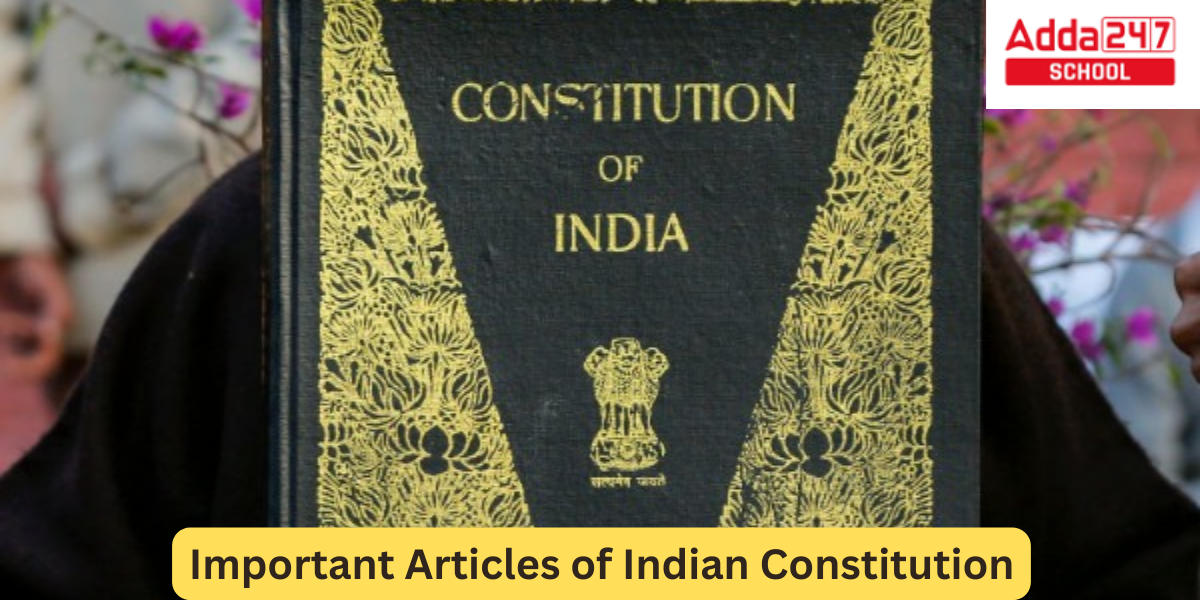Important Articles of Indian Constitution
The Indian Constitution is the country’s highest law. The document outlines the framework that delineates the core political code, as well as the fundamental rights, guiding principles, and responsibilities of citizens. It also spells out the organisation, methods, powers, and duties of governmental institutions.
Important Articles of Indian Constitution: Parts of Constitution of India
| PART | Part Name | Articles |
| Part I | Union & Its Territory | Article 1-4 |
| Part II | Citizenship | Article 5-11 |
| Part III | Fundamental Rights | Article 12-35 |
| Part IV | Directive Principles | Article 36-51 |
| Part IV A | Fundamental Duties | Article 51A |
| Part V | The Union | Article 52-151 |
| Part VI | The States | Article 152-237 |
| Part VII | Part 7 Repealed by 7th Amendment Act, 1956 | – |
| Part VIII | The Union Territories | Article 239-242 |
| Part IX | The Panchayats | Article 243-243O |
| Part IX A | The Municipalities | Article 243P-243ZG |
| Part IX B | Co-operative Societies | Article 243ZH-243ZT |
| Part X | Scheduled and Tribal Areas | Article 244-244A |
| Part XI | Relation between Union & States | Article 245-263 |
| Part XII | Finance, Property, Contracts and Suits | Article 264-300A |
| Part XIII | Trade, Commerce and Intercourse within the territory of India | Article 301-307 |
| Part XIV | Services under the Union and States | Article 308-323 |
| Part XIV A | Tribunals | Article 323A-323B |
| Part XV | Elections | Article 324-329A |
| Part XVI | Special Provisions relating to certain classes | Article 330-342 |
| Part XVII | Official Languages | Article 343-351 |
| Part XVIII | Emergency Provisions | Article 352-360 |
| Part XIX | Miscellaneous | Article 361-367 |
| Part XX | Amendment of the Constitution | Article 368 |
| Part XXI | Temporary, Transitional and Special Provisions | Article 369-392 |
| Part XXII | Short title, Commencement, Authoritative Text in Hindi and Repeals |
Article 393-395 |
Let us have a look at the Important Articles of the Indian Constitution in accordance to SSC, UPSC, and CLAT respectively.
Important Articles of Indian Constitution: Preamble of the Indian Constitution
According to the preamble, the solemn determination of the Indian people to create a “Sovereign Socialist Secular Democratic Republic” and accomplish the aims listed in the preamble led to the creation of the Indian constitution. The word “sovereignty” denotes total and utmost authority. It could be real or typical, political or governmental, individual or pluralistic. In monarchies, the rulers were the monarchs themselves. Republican forms of government, which predominate primarily in the modern world, cede sovereignty to the elected representatives of the people.

Important Articles of Indian Constitution for SSC
Let us have a look at the Important Articles of Indian Constitution for SSC:
- Article-1
Union’s name and area.
- Article-2
Acceptance and creation of the state.
- Article-3
establishing new states and changing the names, boundaries, and areas of current states.
- Article-5
citizenship at the time the constitution was adopted.
- Article-6
Citizenship rights of a certain person who immigrated from Pakistan to India.
- Article-10
Citizenship rights continue to exist.
- Article-11
Parliament will enact laws governing citizenship privileges.
- Article-12
The state is differentiated.
- Article-13
laws that either uphold or violate fundamental rights.
Rights to equality: Article-14 to Article-18
- Article-14
Equality before the law
- Article-15
prejudice against people based on their birthplace, ethnicity, caste, religion, or gender is forbidden.
- Article-16
Opportunities equality for those seeking public jobs.
- Article-17
the elimination of untouchability.
- Article-18
removal of titles.
Right to Freedom: Article 19 to 22
- Article19
- Speech and expression rights
- freedom to gather armed-free and in peace
- freedom to form unions or associations
- freedom to go about without restriction on Indian soil.
- Omitted
- freedom to engage in any profession or activity, including trades, businesses, and occupations.
- Article 20
Protection against being found guilty of a crime.
- Article 21
the preservation of life and individual freedom
- Article 22
Protection from arrest and detention in specific situations
Articles 23 through 24 refer to the right against exploitation.
- Article 23
prohibition of forced labour and human trafficking.
- Article 24
preventing the use of minors in workplaces such as mines and factories
Religion-related freedom rights: Articles 25 to 28
- Article-25
Freedom of religion, including the right to practise, proclaim, and spread it.
- Article-26
liberty to conduct one’s religious affairs.
- Article-27
Freedom from having to pay taxes to support a specific faith.
- Article-28
Freedom to participate in religious education.
Rights to culture and education: articles 29 to 32
- Article-29
protection of minorities’ interests
- Article-30
Minority establishment and management rights
- Article-32
Directive principal of states policy (Article-36 to Article-51)
Procedures for upholding fundamental rights
- Article-36
Definition
- Article-37
Application DPSP (Directive Principles of States Policy).
- Article-39A
Free legal aid and equal justice.q1
- Article-40
creation of a panchayat in a village.
- Article-41
right to employment, education, and, in some circumstances, public support.
- Article-43
Worker living pay, etc.
- Article-43A
involvement of employees in managing industries.
- Article-44
Standard Civil Code (Applicable in Goa only).
- Article-45
provision for children’s education to be both free and required.
- Article-46
promotion of scheduled castes (SC), scheduled tribes (ST), and OBC economic and educational interests.
- Article-47
It is the responsibility of the state to improve public health, raise nutritional standards, and raise living standards.
- Article-48
Agriculture and animal husbandry are organised.
- Article-49
Protection of activities, locations, and items of natural significance.
- Article-50
separation between the executive and judicial branches.
- Article-51
promotion of global security and peace.
Let us have a look at the other Important Articles of Indian Constitution for SSC:
| Articles | About the Articles |
| Article 12-35 | Fundamental Rights |
| Article 36-50 | Directive Principles of State Policy |
| Article 51A | Fundamental Duties |
| Article 80 | Number of Seats in Rajya Sabha |
| Article 243-243 (o) | Panchayati Raj Institutions |
| Article 343 | Hindi as Official Language |
| Article 356 | Imposition of President’s Rule |
| Article 370 | Special Status of Jammu & Kashmir |
| Article 395 | Repeals Indian Independence Act and Government of India Act 1919 |
Anti Defection Law in India, Amendment and Schedule
Important Articles of Indian Constitution for UPSC
Let us have a look at the Important Articles of Indian Constitution for SSC:
- Article-1
Union’s name and area.
- Article-2
Acceptance and creation of the state.
- Article-3
establishing new states and changing the names, boundaries, and areas of current states.
- Article-5
citizenship at the time the constitution was adopted.
- Article-6
Citizenship rights of a certain person who immigrated from Pakistan to India.
- Article-10
Citizenship rights continue to exist.
- Article-11
Parliament will enact laws governing citizenship privileges.
- Article-12
The state is differentiated.
- Article-13
laws that either uphold or violate fundamental rights.
Rights to equality: Article-14 to Article-18
- Article-14
Equality before the law
- Article-15
prejudice against people based on their birthplace, ethnicity, caste, religion, or gender is forbidden.
- Article-16
Opportunities equality for those seeking public jobs.
- Article-17
the elimination of untouchability.
- Article-18
removal of titles.
Right to Freedom: Article 19 to 22
- Article19
- Speech and expression rights
- freedom to gather armed-free and in peace
- freedom to form unions or associations
- freedom to go about without restriction on Indian soil.
- Omitted
- freedom to engage in any profession or activity, including trades, businesses, and occupations.
- Article 20
Protection against being found guilty of a crime.
- Article 21
the preservation of life and individual freedom
- Article 22
Protection from arrest and detention in specific situations
Articles 23 through 24 refer to the right against exploitation.
- Article 23
prohibition of forced labour and human trafficking.
- Article 24
preventing the use of minors in workplaces such as mines and factories
Religion-related freedom rights: Articles 25 to 28
- Article-25
Freedom of religion, including the right to practise, proclaim, and spread it.
- Article-26
liberty to conduct one’s religious affairs.
- Article-27
Freedom from having to pay taxes to support a specific faith.
- Article-28
Freedom to participate in religious education.
Rights to culture and education: articles 29 to 32
- Article-29
protection of minorities’ interests
- Article-30
Minority establishment and management rights
- Article-32
Directive principal of states policy (Article-36 to Article-51)
Procedures for upholding fundamental rights
- Article-36
Definition
- Article-37
Application DPSP (Directive Principles of States Policy).
- Article-39A
Free legal aid and equal justice.q1
- Article-40
creation of a panchayat in a village.
- Article-41
right to employment, education, and, in some circumstances, public support.
- Article-43
Worker living pay, etc.
- Article-43A
involvement of employees in managing industries.
- Article-44
Standard Civil Code (Applicable in Goa only).
- Article-45
provision for children’s education to be both free and required.
- Article-46
promotion of scheduled castes (SC), scheduled tribes (ST), and OBC economic and educational interests.
- Article-47
It is the responsibility of the state to improve public health, raise nutritional standards, and raise living standards.
- Article-48
Agriculture and animal husbandry are organised.
- Article-49
Protection of activities, locations, and items of natural significance.
- Article-50
separation between the executive and judicial branches.
- Article-51
promotion of global security and peace.
Let us have a look at the other Important Articles of Indian Constitution for UPSC:
| Articles | About the Articles |
| Article 51A | Fundamental Duties |
| Article 76 | Attorney-General for India |
| Article 80 | Number of Seats in Rajya Sabha |
| Article 112 | Annual financial Budge |
| Article 148 | Comptroller and Auditor– General of India |
| Article 149 | Duties and Powers of CAG |
| Article 243-243 (o) | Panchayati Raj Institutions |
| Article 343 | Hindi as Official Language |
| Article 356 | Imposition of President’s Rule |
| Article 370 | Special Status of Jammu & Kashmir |
| Article 395 | Repeals Indian Independence Act and Government of India Act 1919 |
President of India Powers, List, Eligibility
Important Articles of Indian Constitution for CLAT
Let us have a look at the Important Articles of Indian Constitution for CLAT:
- Article-1
Union’s name and area.
- Article-2
Acceptance and creation of the state.
- Article-3
establishing new states and changing the names, boundaries, and areas of current states.
- Article-5
citizenship at the time the constitution was adopted.
- Article-6
Citizenship rights of a certain person who immigrated from Pakistan to India.
- Article-10
Citizenship rights continue to exist.
- Article-11
Parliament will enact laws governing citizenship privileges.
- Article-12
The state is differentiated.
- Article-13
laws that either uphold or violate fundamental rights.
Rights to equality: Article-14 to Article-18
- Article-14
Equality before the law
- Article-15
prejudice against people based on their birthplace, ethnicity, caste, religion, or gender is forbidden.
- Article-16
Opportunities equality for those seeking public jobs.
- Article-17
the elimination of untouchability.
- Article-18
removal of titles.
Right to Freedom: Article 19 to 22
- Article19
- Speech and expression rights
- freedom to gather armed-free and in peace
- freedom to form unions or associations
- freedom to go about without restriction on Indian soil.
- Omitted
- freedom to engage in any profession or activity, including trades, businesses, and occupations.
- Article 20
Protection against being found guilty of a crime.
- Article 21
the preservation of life and individual freedom
- Article 22
Protection from arrest and detention in specific situations
Articles 23 through 24 refer to the right against exploitation.
- Article 23
prohibition of forced labour and human trafficking.
- Article 24
preventing the use of minors in workplaces such as mines and factories
Religion-related freedom rights: Articles 25 to 28
- Article-25
Freedom of religion, including the right to practise, proclaim, and spread it.
- Article-26
liberty to conduct one’s religious affairs.
- Article-27
Freedom from having to pay taxes to support a specific faith.
- Article-28
Freedom to participate in religious education.
Rights to culture and education: articles 29 to 32
- Article-29
protection of minorities’ interests
- Article-30
Minority establishment and management rights
- Article-32
Directive principal of states policy (Article-36 to Article-51)
Procedures for upholding fundamental rights
- Article-36
Definition
- Article-37
Application DPSP (Directive Principles of States Policy).
- Article-39A
Free legal aid and equal justice.q1
- Article-40
creation of a panchayat in a village.
- Article-41
right to employment, education, and, in some circumstances, public support.
- Article-43
Worker living pay, etc.
- Article-43A
involvement of employees in managing industries.
- Article-44
Standard Civil Code (Applicable in Goa only).
- Article-45
provision for children’s education to be both free and required.
- Article-46
promotion of scheduled castes (SC), scheduled tribes (ST), and OBC economic and educational interests.
- Article-47
It is the responsibility of the state to improve public health, raise nutritional standards, and raise living standards.
- Article-48
Agriculture and animal husbandry are organised.
- Article-49
Protection of activities, locations, and items of natural significance.
- Article-50
separation between the executive and judicial branches.
- Article-51
promotion of global security and peace.
Let us have a look at the other Important Articles of Indian Constitution for CLAT:
| Articles | About the Articles |
| Article 51A | Fundamental Duties |
| Article 76 | Attorney-General for India |
| Article 80 | Number of Seats in Rajya Sabha |
| Article 112 | Annual financial Budge |
| Article 124 | Establishment of supreme Court. |
| Article 125 | Salaries of judges. |
| Article 126 | Appointment of acting chief justice. |
| Article 127 | Appointment of ad–hoc judges |
| Article 128 | Attendance of retired judge at sitting of the Supreme Court |
| Article 129 | Supreme Court to be a court of Record |
| Article 130 | Seat of the Supreme Court |
| Article 136 | Special leaves for an appeal to the Supreme Court |
| Article 137 | Review of judgment or orders by the Supreme Court |
| Article 141 | Decision of the Supreme Court binding on all the courts |
| Article 148 | Comptroller and Auditor– General of India |
| Article 149 | Duties and Powers of CAG |
| Article 243-243 (o) | Panchayati Raj Institutions |
| Article 343 | Hindi as Official Language |
| Article 356 | Imposition of President’s Rule |
| Article 370 | Special Status of Jammu & Kashmir |
| Article 395 | Repeals Indian Independence Act and Government of India Act 1919 |
Constitution of India Articles, Preamble and Purpose
Bharat ka Samvidhan Kab Lagu Hua- भारत का संविधान कब लागू हुआ











 HPBOSE Compartment Date Sheet 2025 Out, ...
HPBOSE Compartment Date Sheet 2025 Out, ...
 RUHS Counselling 2025 Round 1 Seat Allot...
RUHS Counselling 2025 Round 1 Seat Allot...
 Bihar Board Dummy Registration Card 2026...
Bihar Board Dummy Registration Card 2026...










